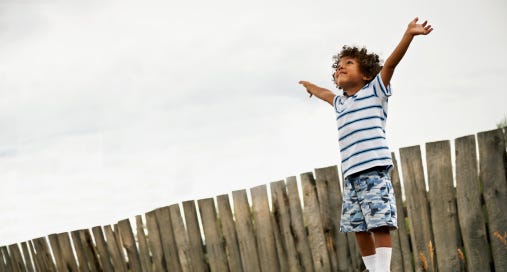Welcome to Raising Good Humans on Bulletin. We are so happy you're joining our judgment-free, science-backed parenting community. Subscribe now to get these articles in your inbox every week, AND consider becoming a premium member for exclusive behind-the-scenes access, LIVE Q&A's, and more original content.
After my conversation with Dr. Sian Beilock, president of Barnard College and president-elect of Dartmouth College, for the latest episode of the Raising Good Humans podcast, I have been thinking a lot about creating a brave space.
Dr. Beilock’s work, and so much of the research in child development, demonstrates for us just how much of a role parents can play in creating a family culture where not only is it OK for our children to take risks, and OK for them to fail, it is paramount to growth. Dr. Beilock calls this a brave space. Unlike a Safe Space, it isn’t an environment in which our kids will feel comfortable, but one in which they can be safely challenged with our support. This idea builds on the work of Dr. Carol Dweck, and the idea of a growth mindset. From that work, we know that our children’s understanding of what it feels like to work hard, practice, and be challenged, sets the stage for how they will take risks and approach obstacles.
Here are some of my favorite key take-aways for everyday parenting moments.
These are tips for you as a parent, and tips on how to share this information with your children. When it comes to managing stress and taking on challenges, we’ve all got a lot to practice!
Re-interpret the signs of stress as positive. Take that racing heart rate, those sweaty palms, those wild butterflies, and reinterpret them as signs your body is preparing for a challenge. That is a GOOD thing.. Instead of being scared of them, consider that they are making you prepared, focusing your thoughts and attention, and getting the job done. As Dr. Beilock and I discussed, stress reactions are not all bad. They also keep us alive, keep us functioning in our day to day lives, and keep us sharp when we need to be.
Get comfortable with the uncomfortable. As a parent, accept that your child will experience discomfort. Your child will have to sit with that feeling of being uncomfortable, they will have to fall, in order to practice living through that experience. You want your child to manage uncomfortable situations and succeed, and they need to do that time and time again to get there. For our children, create an atmosphere where being uncomfortable is OK, where those feelings are heard, and validated, but not solved for them.
Distinguish that failures are not indicative of who we are, but an opportunity to learn and sometimes the only path to getting better. Instead of saying “I’m not a math person,” think of yourself (or coach your child to think), “I haven’t figured out the right way for me to study and learn this information yet.” Parents need to model this with their own self-talk (and forgiveness around mistakes), and with language that speaks to their challenges and struggles.
Dr. Beilock and I did a quick improv to create this script for an 11 year-old who says, “I’m going to fail this math test, and my body feels sweaty.”
“That’s your body helping you to get ready and focused for what lies ahead.” (Re-interpret the bodily signals)
“I know you're nervous walking into a test. That’s totally normal.” (Validate)
“Remember we studied and you did well on the practice problems. You know the facts and you’ve worked hard at this.” (Focus on the effort)
“If you don’t do well, it’s not the end of the world. We’ll figure out how to study differently.” (Overcome the fear of failure, or the fixed mindset)
A few last thoughts.
Express your values. Research shows that when parents value science and math, when they think those subjects are important for the future, their children are more likely to take on challenges in those areas.
Take down the idea of perfect. Make sure you talk about the work, struggles and failures that got successful people to where they are. Discuss the winding road that many successful people have had, and how that allowed them to grow and change. Have a developmental mindset about growth and learning, instead of a perfectionist view where failures are unacceptable. (See my previous articles on perfectionism here and here).
When it comes to performance - the speech, the test, the game - do your best to mimic the actual situation for practice. Think about recreating the environment, do practice problems, role-play. Once we’ve had the chance to practice, the moment itself is far less uncomfortable.
Take on challenges as a family. Set goals (even small ones) and model the steps to get there.
I hope this conversation helps you to find your brave space, and create one for your children. I’m leaving hopeful and inspired. Maybe I’ll even attempt to parallel park today (one of my own personal challenges).
Warmly,
Thanks for being a part of Raising Good Humans. We are in this together.





